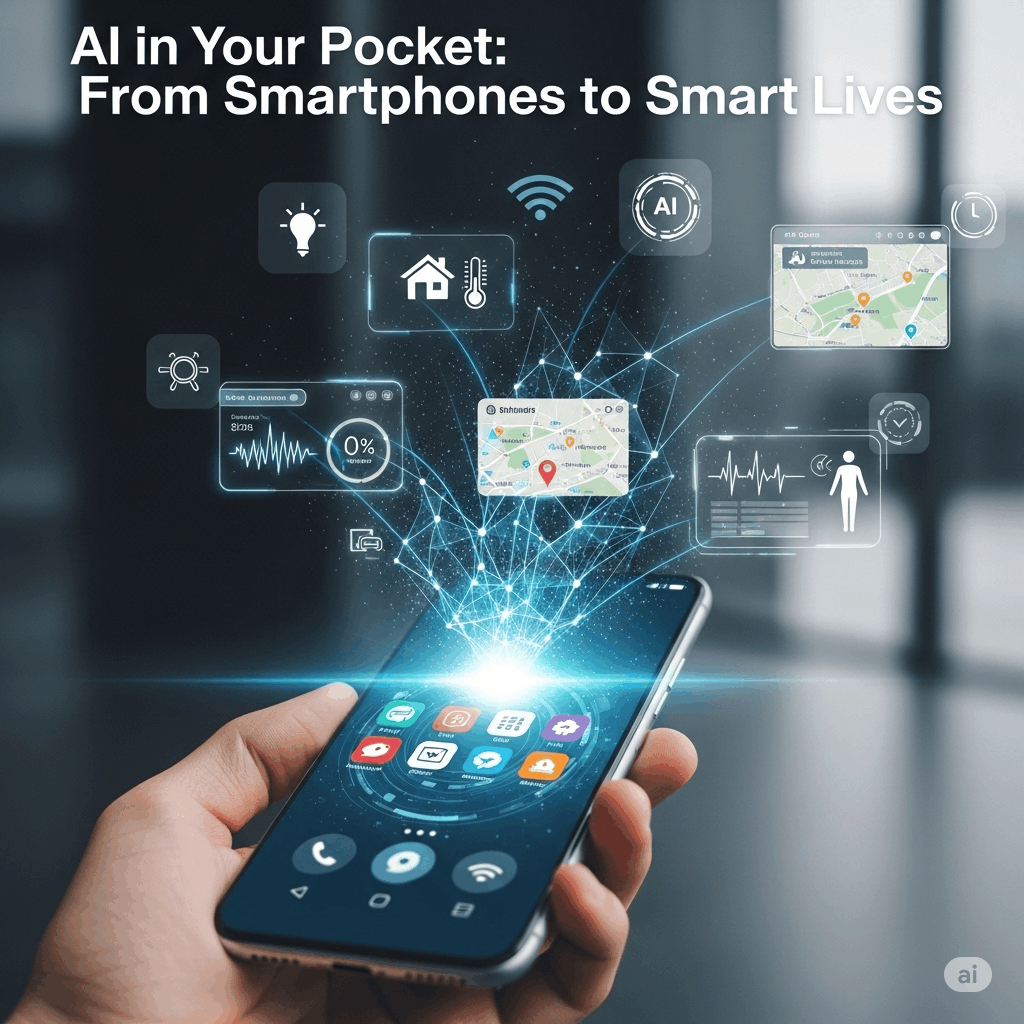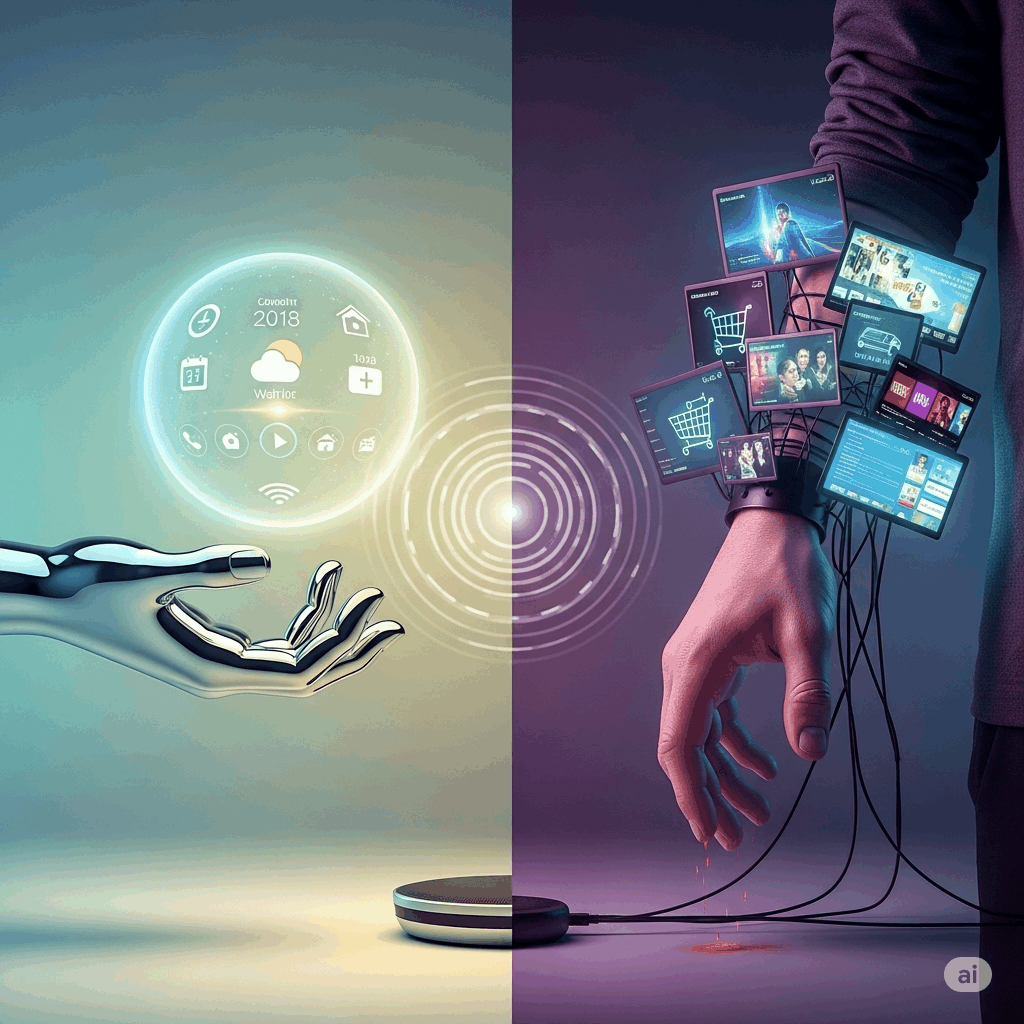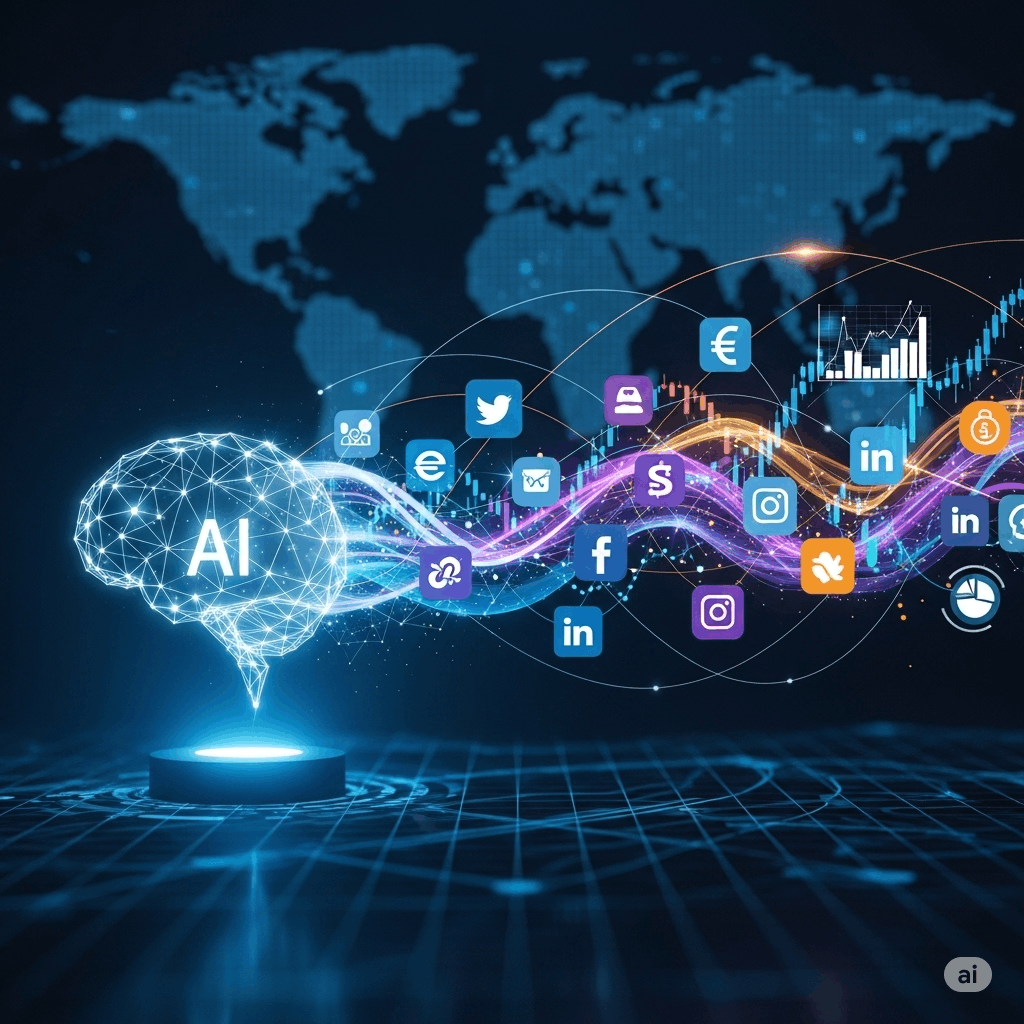AI in Your Pocket: From Smartphones to Smart Lives
The silent revolution shaping our digital existence.
Remember when your smartphone was just for calls and texts? Fast forward to today, and that sleek device in your hand is a powerful AI hub, silently revolutionizing everything from how you capture memories to how you manage your home. Artificial intelligence isn't just a buzzword; it's the invisible engine transforming our smartphones into gateways to smarter, more intuitive lives.
---The Brains Behind the Screen: How AI Enhances Your Smartphone
At its core, **AI on your smartphone** is about making your device more intelligent and responsive to *you*. It learns your habits, anticipates your needs, and simplifies complex tasks. This isn't theoretical; it's embedded in the very fabric of your daily interactions with your device. From the moment you pick it up, AI is working behind the scenes, continually optimizing and enhancing your mobile experience. Let's delve into the key areas where AI truly shines.
Computational Photography: Redefining Visual Storytelling
Gone are the days of needing professional equipment for stunning photos. AI algorithms in your phone's camera now intelligently recognize scenes, optimize settings, enhance portraits, and even stabilize videos – all to give you perfect shots with minimal effort. This isn't just about applying filters; it's about a deep understanding of light, composition, and subject matter, allowing your phone to act as a seasoned photographer.
The Magic Behind the Lens:
- Scene Recognition: Your phone's AI instantly identifies what you're pointing at – be it a pet, food, landscape, or a human face. This recognition allows it to adjust exposure, white balance, and saturation for optimal results, making your greens greener and your blues bluer, without oversaturation.
- HDR (High Dynamic Range) Merging: AI quickly captures multiple exposures (some dark, some light) and intelligently stitches them together, preserving detail in both shadows and highlights. This prevents blown-out skies and murky foregrounds, especially in challenging lighting conditions.
- Portrait Mode and Bokeh Effects: Using sophisticated **semantic segmentation**, AI precisely separates the subject from the background, then artfully blurs the background to create a shallow depth-of-field effect, mimicking professional DSLR cameras. This process is constantly refined to handle complex hair, glasses, and irregular shapes.
- Low-Light and Night Modes: AI combines multiple frames captured over a short period, aligning them perfectly, reducing noise, and boosting light information to create remarkably clear and vibrant images even in near darkness. It can discern fine details that would be invisible to the naked eye.
- Video Stabilization: Beyond optical image stabilization (OIS), AI-powered electronic image stabilization (EIS) predicts motion and corrects for shaky hands in real-time, resulting in remarkably smooth video footage. Modern techniques even integrate AI for cinematic modes that allow focus shifts after recording.
- Intelligent Editing and Enhancement: Features like Google's Magic Eraser or Apple's Photographic Styles are prime examples of AI making advanced photo editing accessible to everyone. AI can remove unwanted objects, adjust skin tones, or apply sophisticated stylistic changes with a tap, automating complex tasks that once required manual precision.
Voice Assistants That Understand: More Than Just Command Responders
Siri, Google Assistant, Amazon Alexa (via mobile apps), and others have evolved far beyond simple commands. They leverage **Natural Language Processing (NLP)** and **Machine Learning (ML)** to understand context, remember conversational history, and respond to natural speech patterns, making interactions feel more human and intuitive.
The Evolution of Conversational AI:
- Contextual Understanding: Modern voice assistants don't just process keywords; they understand the nuances of your request, remembering previous parts of the conversation. If you ask "What's the weather like?" and then "How about tomorrow?", the AI knows "tomorrow" refers to the weather.
- Natural Language Generation (NLG): Their responses are no longer robotic. They can generate human-like text, providing information in a clear, concise, and often conversational manner, even adapting their tone over time to match your preferences.
- Real-time Translation: Many flagship phones can now seamlessly translate conversations in over 100 languages, breaking down communication barriers instantly. This relies on advanced neural machine translation models that run partly on-device for speed and partly in the cloud for accuracy.
- Proactive Suggestions: Based on your calendar, location, and past behaviors, voice assistants can proactively offer directions to your next meeting, remind you to leave for an appointment, or suggest calling a contact based on your routine.
- Integration with Apps and Services: Voice assistants act as a central hub, capable of controlling smart home devices, sending messages, setting reminders, playing music, and even ordering food, all through voice commands integrated with various applications on your phone.
Predictive Personalization: Your Phone, Tailored to You
Your phone knows you better than you think. AI analyzes your usage patterns to offer highly personalized experiences, transforming your device from a generic tool into a truly personal assistant. This constant learning and adaptation makes your smartphone feel uniquely yours.
Anticipating Your Needs:
- Adaptive Battery Management: AI learns your charging habits and app usage patterns to optimize battery life. It can put less frequently used apps into a deeper sleep state and prioritize power to the apps you're actively using, often predicting when you'll need peak performance.
- App Suggestions: Based on the time of day, your location, and recent activities, AI will suggest relevant apps. Heading to the gym? Your fitness app might appear prominently. Entering the office? Email and calendar apps could be prioritized.
- Content Recommendations: From curating music playlists and suggesting relevant news articles to recommending videos and podcasts, AI engines continuously refine their suggestions based on your past consumption and expressed preferences, keeping you engaged with content you'll genuinely enjoy.
- Smart Replies and Text Prediction: AI-powered keyboards and messaging apps predict your next words or even entire phrases, significantly speeding up typing. Smart Reply features offer contextually relevant short responses to messages, saving you time and effort.
- Adaptive Display and Sound: AI can adjust screen brightness and color temperature based on ambient light and your viewing habits. Some phones also use AI to optimize audio output based on the environment or the type of media being consumed.
Smarter Security: Fortifying Your Digital Frontier
The security of your personal data is paramount, and AI plays an increasingly critical role in safeguarding it. Facial recognition and fingerprint scanning, powered by sophisticated AI algorithms, provide robust biometric authentication, making your device and data more secure. Beyond unlocking, AI actively monitors for threats.
AI as Your Digital Guardian:
- Biometric Authentication: Modern facial recognition systems (like Apple's Face ID) use advanced neural networks to map unique features of your face in 3D, making them highly secure and resistant to spoofing attempts. Fingerprint sensors also leverage AI to improve recognition accuracy over time, even with partial prints or slight variations.
- Malware and Phishing Detection: AI constantly monitors app behavior, network traffic, and incoming messages to detect and flag suspicious activity, enhancing fraud detection in banking apps and alerting you to potential phishing attempts or malware downloads. It learns new threat patterns to stay ahead of malicious actors.
- Anomaly Detection: If your phone detects unusual login attempts from unfamiliar locations or devices, or if an app starts behaving abnormally (e.g., requesting excessive permissions or sending unusual data), AI can flag these as potential security breaches and alert you.
- On-Device Security Processing: Many modern chipsets include dedicated **secure enclaves** and **AI accelerators** that handle sensitive biometric data and cryptographic operations entirely on the device, never sending this information to the cloud, significantly enhancing privacy and security.
Beyond the Handset: AI Extending to Your Smart Life
The impact of AI in your pocket extends far beyond the smartphone itself, acting as a central control for your increasingly smart environment. Your smartphone, augmented by AI, is becoming the nexus of your digital and physical worlds, offering unparalleled control and automation.
Smart Home Command Center: Orchestrating Your Connected World
Your smartphone, integrated with AI, becomes the brain of your smart home. Voice commands through your phone can control lighting, adjust thermostats (which themselves use AI to learn your preferences), manage security cameras, and even schedule robotic vacuum cleaners. AI in these systems learns your routines, optimizing energy efficiency and enhancing convenience.
A Truly Intelligent Home:
- Centralized Control: Through dedicated smart home apps (e.g., Google Home, Apple HomeKit, Amazon Alexa app), your smartphone allows you to manage all your connected devices from a single interface, regardless of brand, thanks to AI-powered interoperability layers.
- Automated Routines and Scenes: AI learns your daily patterns – when you wake up, leave for work, or go to bed. It can then automate actions: lights dimming at sunset, doors locking when you leave, or the thermostat adjusting based on your presence. "Scenes" allow you to trigger multiple actions with a single command, like a "Movie Night" scene that dims lights, closes blinds, and turns on the TV.
- Energy Efficiency: Smart thermostats use AI to learn your heating and cooling preferences, optimizing energy consumption by predicting when you'll be home and adjusting temperatures accordingly, often saving significant amounts on utility bills.
- Enhanced Security and Monitoring: Connect to smart cameras and video doorbells from your phone, with AI providing intelligent alerts (e.g., distinguishing between a person, a package, or an animal), reducing false alarms and enhancing peace of mind.
- Voice Control Integration: Seamlessly issue commands to your smart home devices using your phone's voice assistant, making it effortless to manage your environment without lifting a finger.
Personal Health and Wellness Coach: Empowering a Healthier You
Many health and fitness apps on your smartphone now leverage AI to provide personalized wellness recommendations. They can continuously monitor vital signs, analyze sleep patterns, and even detect potential health concerns based on subtle biometric changes. AI-driven fitness coaches can create tailored workout plans and provide real-time feedback, acting as a personal trainer in your pocket.
AI for Well-being:
- Activity Tracking and Coaching: AI analyzes data from your phone's sensors (accelerometers, gyroscopes) and connected wearables to track steps, distance, calories burned, and active minutes. It can then provide personalized coaching, motivate you to reach goals, and suggest optimized workout routines based on your performance and recovery needs.
- Sleep Analysis: AI-powered apps monitor sleep cycles (light, deep, REM), detect disturbances, and offer insights into sleep quality. They can suggest improvements to your sleep environment or habits to enhance restorative sleep.
- Heart Rate and ECG Monitoring: Smartwatches and some smartphones, coupled with AI, can continuously monitor heart rate, detect irregular heart rhythms (like atrial fibrillation), and even perform on-demand electrocardiograms (ECGs), providing early warnings for potential cardiac issues.
- Stress and Mindfulness: AI can analyze your voice patterns or biometric data (e.g., heart rate variability) to detect stress levels and recommend mindfulness exercises, guided meditations, or breathing techniques available through apps.
- Nutrition and Diet Management: AI-powered food logging apps can analyze photos of your meals, estimate nutritional content, and provide personalized dietary advice, helping you track macros, micros, and calorie intake effectively.
Streamlined Daily Routines: The Everyday Assistant
From planning your travel itineraries with AI-powered virtual assistants to getting real-time traffic updates from navigation apps, AI in your smartphone streamlines countless daily tasks. It can help you compose professional emails, summarize long articles, and even provide personalized learning experiences, making every day more efficient.
Effortless Efficiency:
- Intelligent Navigation and Travel: Beyond basic GPS, AI-driven navigation apps provide real-time traffic predictions, suggest alternative routes based on unforeseen congestion, and even learn your preferred routes and times. AI also assists in travel planning, suggesting flights, hotels, and local attractions based on your interests and budget.
- Smart Calendar and Scheduling: AI can analyze your schedule, suggest optimal times for meetings, send reminders, and even automatically add events based on emails or messages you receive, helping you manage your time effectively.
- AI-Powered Productivity Tools: Mobile apps with integrated AI can help you draft emails, summarize lengthy documents or web pages, transcribe voice notes into text, and even generate ideas for presentations or creative writing.
- Personalized Learning and Education: AI adapts educational apps to your learning style and pace, identifying areas where you need more help and providing customized exercises and resources. Language learning apps use AI for pronunciation correction and personalized vocabulary building.
- Optimized Shopping and Commerce: AI in shopping apps provides personalized product recommendations, identifies deals, and can even facilitate augmented reality try-ons for clothing or furniture, enhancing the online shopping experience.
The Road Ahead: What's Next for AI in Your Pocket?
The future promises even more seamless integration of AI into our mobile and daily lives. As processing power on devices continues to increase and AI models become more sophisticated, we can anticipate a transformative leap in mobile intelligence.
Generative AI On-Device: Unleashing Creativity and Productivity
Expect more on-device generative AI capabilities, allowing for instant content creation (text, images, audio) without relying solely on cloud processing. This shift will bring unprecedented speed, privacy, and offline functionality to generative AI tools, making them ubiquitous.
- Instant Content Creation: Imagine drafting entire emails, generating unique images for social media, or even composing short musical pieces directly on your phone, without an internet connection. On-device LLMs will enable smarter chatbots, personalized writing assistants, and creative tools that respond in milliseconds.
- Enhanced Personalization: Generative AI can tailor notifications, interface elements, and app functionality to an even finer degree, creating a truly unique user experience that evolves with you.
- Privacy and Security: Processing generative AI models locally keeps your data on your device, significantly enhancing privacy and reducing concerns about sensitive information being sent to the cloud.
Enhanced Augmented and Mixed Reality: Blending Digital and Physical Worlds
AI will further refine AR experiences, blending digital information seamlessly with your physical world for navigation, shopping, entertainment, and even professional applications. Mobile AR will become truly immersive and interactive, blurring the lines between reality and simulation.
- Smarter Environmental Understanding: AI will enable phones to more accurately map and understand 3D spaces, recognizing objects, surfaces, and even human gestures with greater precision, leading to more realistic and interactive AR applications.
- Contextual Digital Overlays: Imagine pointing your phone at a restaurant and seeing its menu overlaid in AR, or walking through a museum and having AI identify artifacts and display interactive historical information in real-time.
- Interactive Gaming and Education: AR games will become more sophisticated, leveraging AI to create dynamic environments and intelligent virtual characters that interact realistically with your surroundings. Educational apps will offer immersive learning experiences, from dissecting virtual organs to exploring ancient civilizations in your living room.
Deeper Personalization and Proactive Assistance: The Truly Intelligent Companion
Your smartphone will become even more adept at anticipating your needs, proactively suggesting actions, managing tasks, and providing insights based on your evolving habits and preferences. It will transition from a reactive tool to a truly proactive, intelligent companion.
- Anticipatory AI: Your phone won't just react to your commands; it will anticipate them. It might proactively book your favorite coffee order as you approach the cafe, suggest a specific exercise based on your stress levels, or even warn you of potential delays on your commute before you check.
- Cross-Device Intelligence: AI will enable seamless continuity across all your devices – phone, tablet, laptop, wearables, smart home – creating a unified, intelligent ecosystem that learns from your interactions across every touchpoint.
- Emotional Intelligence (Limited): While still in nascent stages, future mobile AI might begin to understand subtle cues in your voice or text, adapting its responses or suggestions to your emotional state, offering empathetic support or adjusting its communication style.
Ethical Considerations and Security Innovations: Navigating the AI Frontier Responsibly
As AI becomes more pervasive, ongoing efforts will focus on addressing ethical concerns like data privacy and algorithmic bias, while continuously innovating AI-powered security measures to counter emerging threats. Responsible AI development will be paramount.
- Privacy by Design: Future AI development will prioritize privacy, with more processing occurring on-device and enhanced transparency about how data is used. Federated learning, where AI models are trained on decentralized user data without directly sharing personal information, will become more common.
- Algorithmic Fairness and Bias Mitigation: Significant research and development are dedicated to identifying and mitigating biases in AI models, ensuring that AI-powered features are fair and equitable for all users, regardless of background or demographics.
- Enhanced AI Security: As AI becomes a target for attackers, AI-powered security systems will evolve to detect and neutralize increasingly sophisticated threats, including deepfakes, AI-generated phishing attempts, and new forms of malware.
- User Control and Transparency: Users will gain greater control over their AI preferences, with clearer explanations of how AI features work and the data they utilize, fostering trust and responsible adoption.
AI in your pocket is no longer a futuristic concept; it's a present-day reality that's quietly making our lives more efficient, convenient, and personalized. From refining the photos we take to intelligently managing our homes and health, AI is profoundly changing our relationship with technology. As this technology continues to evolve, our smartphones will only become more indispensable, acting as intelligent companions guiding us through an increasingly smart world, subtly shaping our smart lives.
"The smartphone is the ultimate chameleon, constantly transforming itself with AI to fit our evolving needs and desires."



